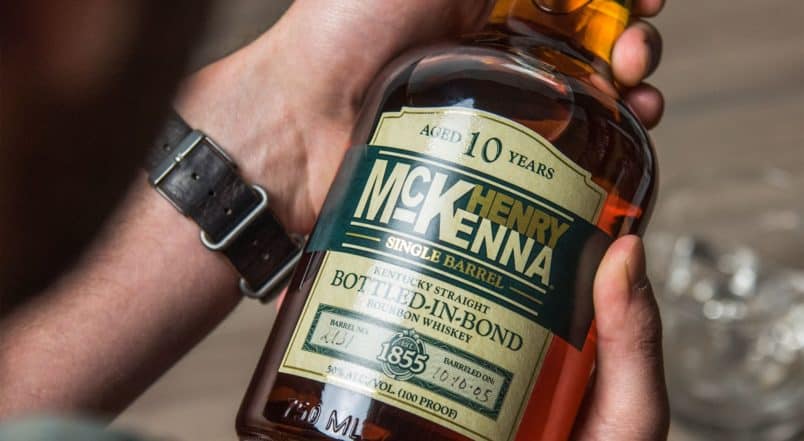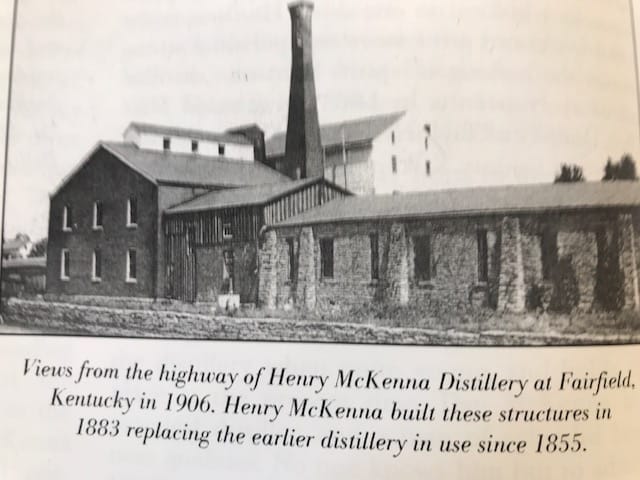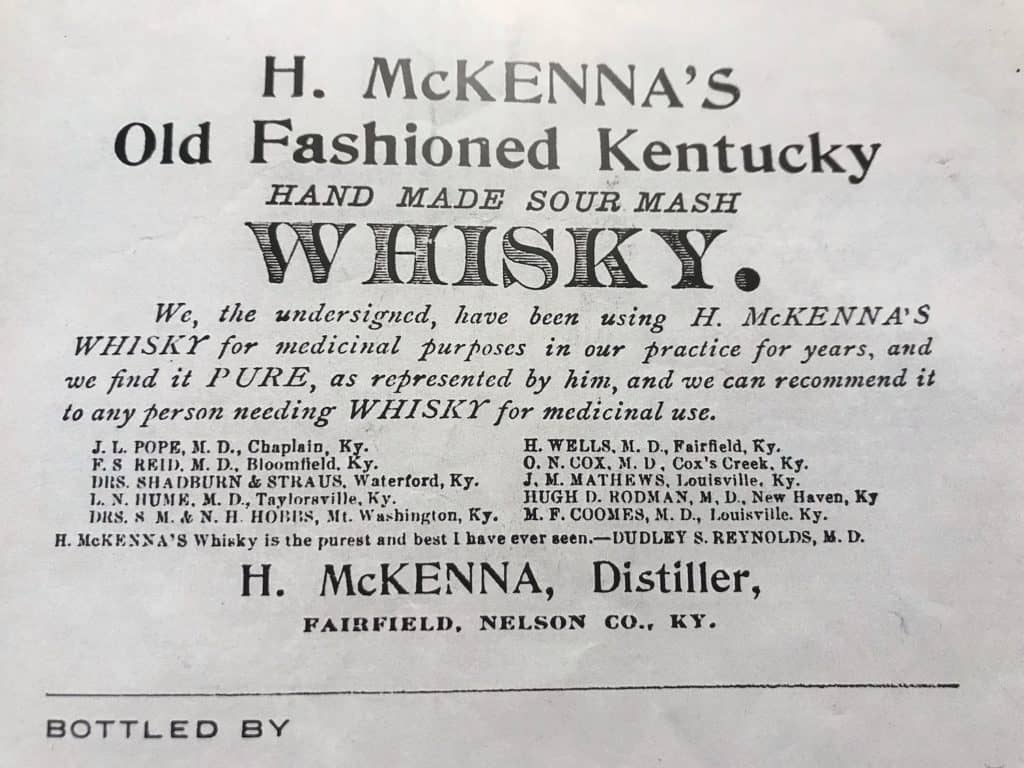
160 years Of H. McKenna Medicinal Whiskey
When Henry McKenna, native of Derry County, Ireland settled in the village of Fairfield, Nelson County , Kentucky in 1851, he was building turnpikes. Having come to America at the age of 18, he arrived in Kentucky in 1838 where he was a contractor and turnpike builder. In Fairfield he entered a milling business. By 1855 he began the manufacture of whisky in a small shed connected to the mill, producing less than a barrel a day. After the war he abandoned the milling business and increased his production to a barrel a day. His reputation for fine whisky and good marketing resulted in the construction of a new brick distillery in 1883. Two bonded warehouses, one of stone and one of wood frame were also added to the older buildings. The wooden brick mold which was used to form the bricks from local clay is still preserved today. Forming three bricks at a time, it was also used to form bricks for his own home and St. Michaels Catholic Church built on his property nearby.
At this time he was producing six barrels a day. He also owned a 360 acre farm which may have supplied many of the grains needed in his business. Unlike other distilleries, McKenna only made “H . McKenna Old Line, Hand Made, Sour Mash Whisky”, no private brands. He never sold whisky to bond until it was three years old which at that time was considered old whisky.

McKenna’s sons Daniel, Stafford and James were involved in the business with Daniel managing the distillery and James promoting and selling the product. Daniel went into the distillery when only eight years of age at a time when they sold whisky at ten cents a quart and twenty-five cents a gallon. At a young age he became manager and distiller along with Patrick Sweeney, another native of Derry County, Ireland. Sweeney was hired as distiller in 1860 and continued until his death. In today’s industry, Sweeney would be hailed as a “Master Distiller” respected throughout the country for his expertise.
James McKenna went to Louisville in 1880 and opened a business on Market Street, but within a year moved to 245 Fourth Street, between Main and Market where he operated as a “Wholesale and Retail Liquor Dealer.” This business was so successful, orders couldn’t be filled so in 1890 he sold out and went on the road for the firm and in 1896 became the Asst. General Manager. At this time the warehouses could hold 8000 barrels.
McKenna never forgot his homeland and returned three times during his Kentucky years to visit friends and relatives. He married an Irish girl, hired a distiller from Ireland, who also married an Irish lass, so it was obvious that the symbol of the Irish Harp would be stenciled under his name on his barrels.
H. McKenna Whisky was marketed throughout the country and it’s great purity was acknowledged by large numbers of physicians certifying it as the best to be used for medicinal purposes. These letters were used to create labels for certain regions noting the name and location of these physicians. In all advertising and listings it was noted to be” Old Whisky for Medicinal Use”. If you were ill you could go to the cabinet to get a drink and also check the bottle for the address of the nearest doctor!

Henry McKenna died in 1893. He always signed his name, on checks, contracts and private correspondence, “ H. McKenna”. He was a man whose word was “… equivalent to a gilt edge bond”. If he promised you a bottle or a barrel of pure whisky, you would get it as represented to be. As other makers of fine whiskey did, putting their name on the label was putting their reputation on the line. Today many distillers sign their labels as an added value to the sale, but “H. McKenna” was recognized as the trusted maker without any additional signing.
H. McKenna Distillery continued production until 1917. After 1919 all barrels were removed to a warehouse in Louisville for bottling for medicinal whiskey. After the repeal of prohibition, the distillery and warehouses were repaired and was the second in the county to resume production in 1934. McKenna’s sons Jim and Stafford McKenna continued the operation. The family sold the distillery to Joseph E. Seagram & Son in 1941. In the early 1980s Seagram sold the brand to Heaven Hill Distillery who now proudly offers the “Henry McKenna” brand for enjoyment, medicinal and otherwise. One hundred and sixty years later, still ”curing what ails you.”
——
A postscript to this story took place on November 7, 1996. Heaven Hill Distillery suffered a disastrous 16 alarm fire with twelve fire departments called out. Seven warehouses and the distillery were destroyed, but no lives were lost. I was in the Bardstown Fire Station that evening trying to help with phone calls, food and other needs when I heard a woman call out, ” Does anyone know if Henry McKenna was hurt?”. I turned around and said, “ What? “ She replied that a man wanted to know if Henry McKenna was burned?
In this tense and serious atmosphere, I had to laugh and I said to her, ”Henry McKenna died a hundred years ago, but if he is asking about his favorite whiskey, tell him I am sure there is some left.” Henry McKenna would have been proud to know a gentleman from a midwest state had such love for his whiskey that he wanted to be sure the grand old whisky was still available for his medicinal or enjoyment needs. That is what’s in a name.

About Dixie Hibbs
Dixie Hibbs is an author and historian who has written 16 books about regional history; Before Prohibition, Distilleries in Nelson County Kentucky, and pictorial histories which include Bourbon-distillery photos. Hibbs also wrote and delivered a presentation called “A Half a Pint of Whiskey History and a Shot of Humor” at a Bourbon flavored luncheon during eight Kentucky Bourbon Festivals in Bardstown. This history of Kentucky spirits covered more than 203 years.
Hibbs is the first woman inducted in the Kentucky Bourbon Hall of Fame, not for making or selling it, but for writing and telling the stories which add so much to the flavor of the spirit. Hibbs was honored by the Bourbon Women Association as the 2019 recipient of the Lois Mateus Networking Award and was inducted into the Order of the Writ.
Hibbs served on the Bardstown City Council for 19 years and was Mayor of the Bourbon Capital of the World for four years. Retiring in 2007 from politics, Hibbs continues to contribute toward Bourbon support in writing a digital walking tour of Bardstown, “Whiskey Walks and Bourbon Talks.”
